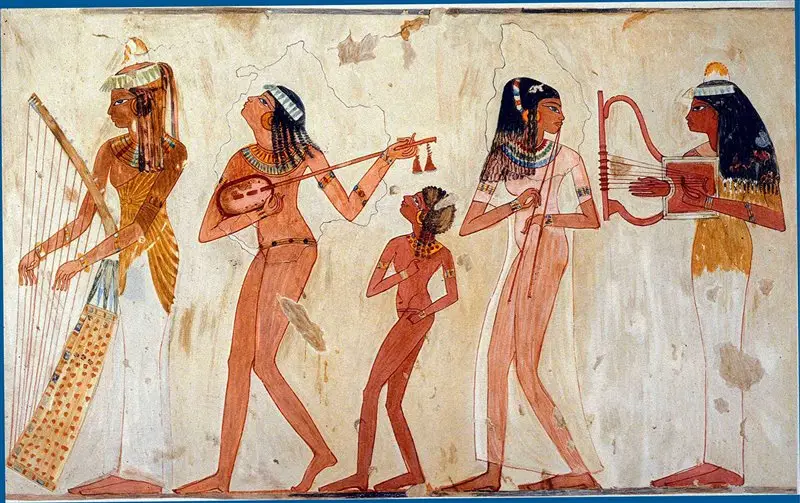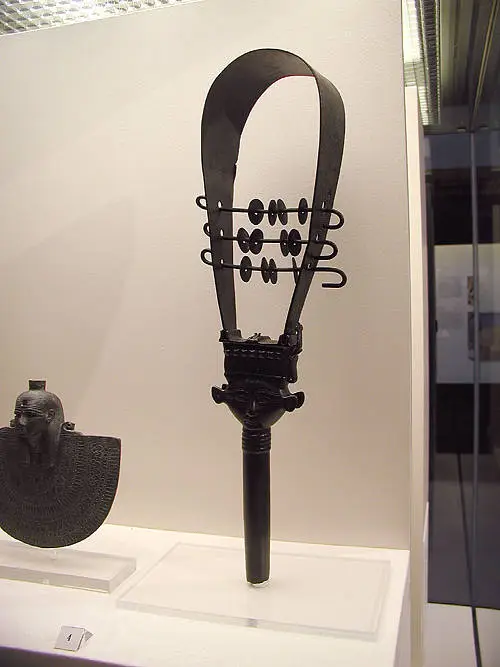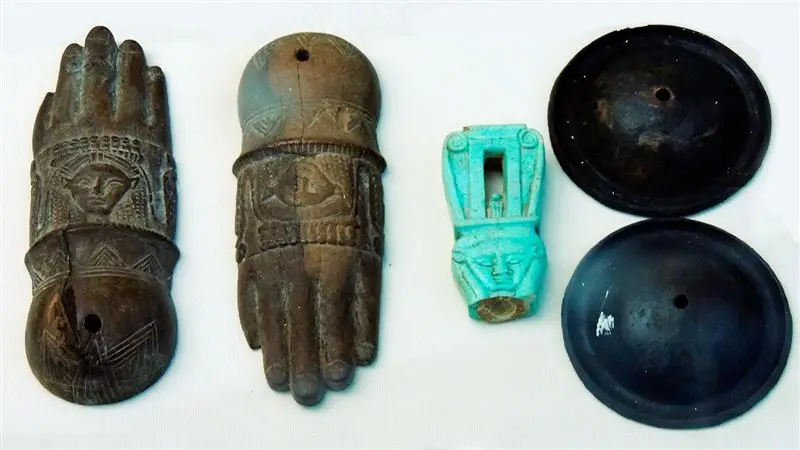Music in Ancient Egypt

Musicians playing at a feast
Music punctuated daily life in Egypt: it was used in religious ceremonies, to cheer the ears of the pharaoh, to accompany funerals, and to invigorate marching armies.
Unfortunately, the notes have not survived, but it is known that they were transmitted orally, and the musician improvised. The higher the skill, the better the improvisation. There were also orchestras, controlled by something like conductors. There are records indicating the existence of music schools at the court of the pharaoh and in the temples. But still, music was taught in families. That the Egyptians loved music is largely confirmed by the rich and varied documentation stored on the walls of tombs, in papyri, and in small objects of everyday life.
Musical Instruments
The love for music began at the dawn stories Egypt. The first musical “instrument” was... clapping hands, which was then replaced by clappers, similar to castanets and shaped like hands. Among the oldest and most famous instruments was the sistrum. It resembled an elongated horseshoe into which three or more movable crossbars were inserted transversely. To make the sistrum sound, it was enough to grab it by the neck and shake it - the moving sticks would sound by hitting the frame. The sistrum was a female musical instrument used by priestesses, princesses and queens during religious ceremonies. This instrument is still used in the Christian liturgy of the Coptic Church in Ethiopia.

Sistrum
Another very ancient instrument is the flute, which could reach almost a meter in length. It was equipped with three or four holes. It is a male instrument that is still used in Persia, Egypt, Turkey and Arabia.
During the New Kingdom period, instruments began to arrive from the Middle East. One of the popular ones at that time was the oboe. It was a purely female instrument, but, however, it was not neglected even by men. Even King Ptolemy XII received the nickname oboist. The oboe replaced the double clarinet, which is still valued in Egypt and the Middle East. The lyre also arrived from the East, which in Mesopotamia arose as a solo, male instrument, and in Egypt became a female instrument. It was played in orchestras. Finally, the harp, one of the most beloved instruments, was often depicted on the walls of tombs. It was played by men and women. There were several models - some were played with a pick, others were played with both hands without it.

Ancient Egyptian firecrackers
Music and gods
Musicians were an important part of the temple staff, and from the time of the Ancient Ones there are documented orchestras whose leadership was entrusted to women of high rank. In sacred places, musical events were common, and real concerts were held in honor of the gods. Music was an offering that the Egyptians believed the deities loved as much as more material food and drink. Many musical instruments were decorated with images of gods. But in Ancient Egypt there was no real musical deity, so different ones were depicted on the instruments. For example, the goddess of joy and intoxication Hathor, who “loved” the sisters, and Bes, who was depicted playing the tambourine or harp.
In the hymn to the goddess Hathor there are these words:
Lady of rejoicing
for the greatness of which music is created [...]
You are the lady of the dance
Lady of Song and Dance.
Music and war
Music also accompanied the marches of the soldiers to give them strength and cheerfulness. Instruments associated with warfare were the kemkem drum, which was also played during some religious ceremonies. It came in different sizes and was cylindrical or barrel-shaped. Leather membranes were attached to a frame made of wood or metal with nails, laces or glue.
Many drum images date back to the New Kingdom. It is depicted in the hands of soldiers, usually Nubians, which suggests its African origin. The trumpet appears in images where victorious soldiers dance to it. In the tomb of Tutankhamun, two pipes were found - silver and copper, which were silent for more than three thousand years. But for a BBC report on April 16, 1939, they were heard again. A video with their sound can be found on YouTube.
Music and death
In ancient Egypt, it was common to decorate tombs with scenes from everyday life, depicting the deceased with their families as they feasted, sipped a cup of good wine, or enjoyed the dancing of slender dancers. Drawing was magical for the Egyptians: they believed that images of certain scenes inside tombs would turn into reality for the soul of the dead. Music is supposed to revive the deceased as soon as he enters the afterlife.
The texts of songs that decorated the walls of houses, temples, and tombs have reached us. The songs were dedicated to family love. As, for example, in the Theban tomb of Neferhotep, where the daughter recites a song in honor of her father, playing the lute:
the first one born from you.
I pray that you are well
and your limbs are energetic.
Over time, one image appears in the Middle Kingdom, and it becomes classic in the New Kingdom. This is an image of a harpist playing his musical instrument while visitors feast. These musicians were called "heretics" because the lyrics of their songs were full of skepticism towards the afterlife, the existence of which was questioned. These are songs that question human death and the need to seize the moment and enjoy earthly pleasures before death takes them from us.
There are lyrics to a song called: “The singing that is found in the tomb of the proclaimed righteous King Antef standing in front of the harp singer" It was found on a papyrus that is now in the British Museum. Words from the passage:
fulfill your destiny on earth.
Don't strain your heart,
until the day of mourning [death] comes;
but doesn't hear crying
one whose heart is already dead;
their crying
does not save anyone from the grave.
Think about it,
have a happy day
and you won’t get tired of it.
You see, there are no those who take their property with them,
you see, the one who left does not return.
The Theban tomb of Ptahemhat, who lived during the reign of Thutmose IV, contains song lyrics that read:
In another Theban tomb, the song ends thus:
The day of landing is the day of death, and only by allowing yourself to enjoy the pleasures of life can you forget about suffering. There are no Egyptian texts that describe the banquet, but Herodotus left us evidence. It may not be completely true, but it reflects the idea of fun and death. According to the Greek historian,
The principle of the ancient Egyptians was to enjoy life while you are alive. And this remains relevant even now, several millennia later.
Information